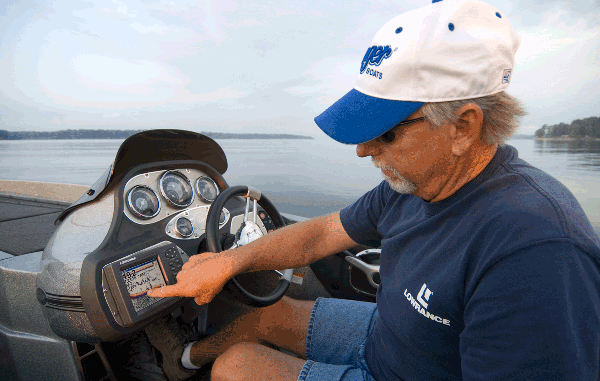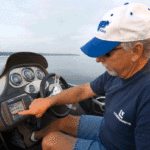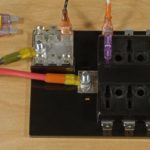
The first thing that springs to mind when an electrical accessory stops working is a blown fuse or popped circuit breaker. In a new boat this usually means pressing the circuit breaker button next to the accessory’s switch or popping the cover off a box near the console and checking the fuse or breaker that protects the now powerless accessory. In the case of a used boat, especially if it has passed through several owners, this could be the start of an Easter egg hunt…
We all customize our boats with neat, new electrical gizmos over time, but not all of us go about it the same way.
Boat owners with a bit of expertise will look for an unused slot in the existing fuse or breaker box to power a new 12-volt gadget. If no more slots exist, they will either install an additional box and use its first slot for the new accessory or they will simply run a new power wire from the battery directly to the new gizmo and add an in-line fuse as close to the battery as possible. Installing the fuse close to the battery protects the wire all the way from the fuse to the accessory.
The ground wire for the new device can come from the nearest common ground connection, or a new ground wire can be routed alongside the new power cable. In a case like this I prefer to install a marine-grade, two-conductor cable: one with black and red wires inside a protective sheath.
Boats with open gunnels or roomy in-floor channels are good candidates for running individual power cables from the battery to new accessories, or to their dash-mounted switches and then to the accessories.
Boats with closed, foam-filled gunnels and built-in wire chases that are already full or difficult to access are better served with new fuse or breaker panels strategically located where you expect to install new gadgets.
You’ll just have to run one larger cable from the battery to the panel instead of struggling to route a new, smaller cable for each new accessory. Don’t forget to install a fuse or breaker in a panel’s power cable that’s large enough to carry the whole panel’s load.
Unfortunately, not every boat owner does this, and when something stops working you may have to trace its power cable, or power and ground wires if they are separate, to their sources in order to find the problem. It’s sometimes frustrating enough in boats with poor wiring access to just go to the battery compartment and pop open everything that looks like a fuse holder in hopes of stumbling into the right blown fuse.
Once you locate the fuse or breaker and restore power to the accessory, it is a good idea to write down the location of the fuse or breaker and note what it protects.
Also, shade-tree accessory installers have been known to install the wrong fuses. A fuse with too low a rating will pop every time you sneeze, and one with too large a rating can sit there happily passing current while a short melts wire insulation and toasts delicate components.
Fuse ratings and wild guesses don’t play well together.
The correct fuse rating can usually be found in the accessory’s owner’s manual, at its manufacturer’s Web site or obtained with a call to its maker’s customer service department.
It should go without saying that the time to investigate your fuse holders and breakers is on a warm weekend afternoon, not in a pitching boat during a blinding rain storm. That weekend afternoon is also a great time to identify the amp rating on every fuse in your boat and make sure you have spares onboard, along with any tools required to replace them.
A close inspection of the fuse holders will also identify any that need to be replaced because they are growing pale-green grunge or developing other problems.
Manual reset breakers are less trouble than fuses, as long as you know where to find each one when its accessory stops working.
Still, it’s not a bad idea to pick up one or two extra breakers and keep them onboard. Examine those on your boat, and if any look like they might be difficult to replace ask your marine dealer to walk you through replacing one.
We’re all adults here and, since this is all basic common-sense stuff, we keep up with it, right? If anyone needs me this afternoon, I’ll be out in the boat with a flashlight and a small notebook…




